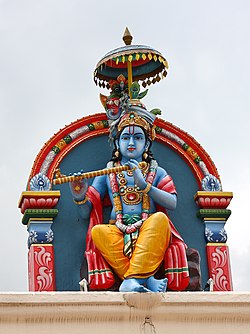Krishna
| Krishna | |
|---|---|
| Divine, Love, Knowledge, Beauty | |

Krishna statute at the Sri Mariamman temple, Singapore
|
|
| Devanagari | कृष्ण |
| Sanskrit transliteration | Kṛṣṇa |
| Affiliation | Svayam Bhagavan, Paramatman |
| Abode | Goloka Vrindavana, Gokula, Dwarka |
| Weapon |
Sudarshana Chakra Kaumodaki |
| Consort | Radha, Rukmini, Satyabhama, Jambavati, Kalindi, Mitravinda, Nagnajiti, Bhadra, Lakshmana and other 16,000 or 16,100 junior queens |
| Parents | Devaki and Vasudeva, Yashoda (foster mother) and Nanda Baba (foster father) |
| Siblings | Balarama, Subhadra |
| Mount | Garuda |
| Texts | Mahabharata, Bhagavad Gita, Vishnu Purana, Bhagavata Purana |
| Festivals | Krishna Janmashtami, Holi |
Krishna (/ˈkrɪʃnə/; Sanskrit: कृष्ण, Kṛṣṇa in IAST, pronounced [ˈkr̩ʂɳə]) is a major Hindu deity worshiped in a variety of different perspectives. Krishna is recognized as the Svayam Bhagavan in his own right or as the absolute incarnation of Lord Vishnu. Krishna is one of the most widely worshiped and popular of all Hindu deities. Krishna's birthday is celebrated every year by Hindus on the eighth day (Ashtami) of the Krishna Paksha (dark fortnight) of the month of Shraavana in the Hindu calendar.
Krishna is also called by several other names such as Govinda, Mukunda, Madhusudhana, and Vasudeva. Krishna is often portrayed as an infant eating butter; a young boy playing a flute, and as in the Bhagavata Purana; a young man along with Radha; or a young man surrounded by women; or as an elderly gentleman giving direction and guidance, as in the Bhagavad Gita. The stories of Krishna appear across a broad spectrum of Hindu philosophical and theological texts. They portray him in various perspectives: a god-child, a prankster, a model lover, a divine hero, and as the Supreme Power. The principal scriptures discussing Krishna's story are the Srimad Bhagavatam, the Mahabharata, the Harivamsa, the Bhagavata Purana, "Krishnacharitmanas" and the Vishnu Purana. The anecdotes and narratives of Krishna, in topic, are generally titled as Krishna Leela. Worship of Krishna, either in the form of a deity or in the form of Vasudeva, Bala Krishna or Gopala can be traced to as early as the 4th century BCE. Worship of Krishna as Svayam Bhagavan, or the Supreme Being known as Krishnaism, arose in the Middle Ages in the context of the Bhakti movement. From the 10th century CE, Krishna became a favorite subject in performing arts and regional traditions of devotion developed for forms of Krishna, such as Jagannatha in Odisha, Vithoba in Maharashtra and Shrinathji in Rajasthan. Since the 1960s, the worship of Krishna has also spread to the Western world and to Africa largely due to the International Society for Krishna Consciousness (ISKCON). Gaudia Math is also a leading proponent of Krishna worship.
...
Wikipedia
